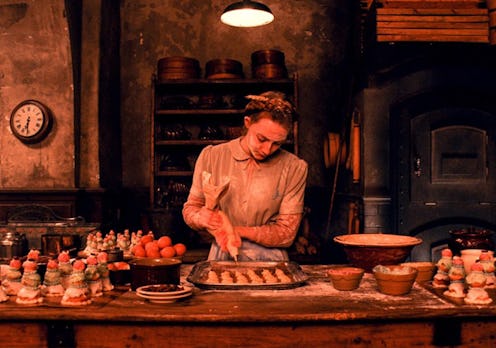Entertainment
How Do Women Fare in 'The Grand Budapest Hotel'?

In a Wes Anderson movie, nothing is accidental. Every prop, every piece of clothing, every handlebar mustache and title card font choice — it's all there for a reason, part of the director's unique, specific style. In Anderson's latest film, The Grand Budapest Hotel , only a complete newcomer to the filmmaker's works wouldn't be able to tell from the very first moments that the film is distinctly his. All the telltale signs are there, from the uniform-like costumes to the story-within-the-story plot device to the blink-and-you-miss-them appearances of Anderson regulars like Bill Murray and Owen Wilson. Yet of all the Anderson-esque things about Budapest, the biggest one of all is not a color palette or a set design, but a simple feature on a character's face: a birthmark in the shape of Mexico, taking up most of the space on Saoirse Ronan's right cheek.
The reason? Because the birthmark, more than any other Anderson design in the film, makes the character look like she's from another world — a distinctly Anderson world, one which complex criminal capers are juxtaposed with spontaneous recitations of poetry, and characters can have country-shaped birthmarks on their cheeks, for no reason other than because they look interesting. On Ronan's expressive face, in particular, the birthmark makes her character unmissable. Everything Agatha does is mesmerizing, the camera and the viewer following her every time she appears on-screen. It's too bad, however, that we don't get a chance to see more of it; Ronan, despite her talent and prestige, barely appears in more than a handful of scenes throughout the entire film.
Ronan, like the few other female actors of The Grand Budapest Hotel, is a minor character in the film. Despite having a substantial role, at least on paper — Agatha, a baker, begins a relationship with the film's lead, Zero (Tony Revolori) —Ronan has hardly any screen-time, with the moments she does have devoted to her feeling about Zero or her involvement with the crime her boyfriend's helping to commit. As for the other women, Tilda Swinton's Madame D and Lea Seydoux's Clotilde, they barely have a few lines of dialogue each. Sure, Madame D's murder drives the film's plot, but it doesn't quite make up for the fact that she's seen in just one scene before she dies.
The lack of women in Budapest is disheartening, but what's even more frustrating is their lack of purpose. Anderson has proven in past films that he's not averse to giving his female characters plots and motivations equal to the men; one only has to re-watch Moonrise Kingdom, with its intelligent, complex female heroine, to see this. Yet in Budapest, everything interesting that occurs happens to the men, not the women. It's the men who search for Gustave (Ralph Fiennes). It's the men who fight for "Boy With Apple." It's the men who tell the story-within-the-story about the Grand Budapest. As for the women, they stick to the background, only showing up to help out the men or flaunt the latest Wes Anderson makeup design.
What makes Budapest different than most Bechdel-test-failing films, though, is that its sexism isn't necessarily its fault. The movie is a story about men, and although it would've been nice to see a few more women represented, it's allowed to have a male focus. The friendship between Zero and Gustave is the film's main element, and as for the supporting characters, nearly all of them have to be male. Gustave's (SPOILER) fellow prison inmates, the concierge and lobby boys working at the hotel — in keeping with the film's setting, it's only realistic that they're played solely by male actors.
That doesn't mean, however, that Anderson gets off the hook for not including more women. He might not have been able to cast more females in the main roles, but as for the ones he did have, like Ronan and Swinton, he could've given them much more to do. Instead, he sidelines them, perhaps hoping that their eye-popping looks will distract from their pitiful story arcs. It's a shame, because both actresses are incredibly talented. Swinton's an Oscar winner, and Ronan a nominee; if he had wanted, Anderson could've made them into characters as multi-faceted and intriguing as any of the movie's men.
His decision not to is unfortunate, because otherwise, there's much to love about The Grand Budapest Hotel. It's gorgeously designed, elaborately plotted, and, per usual with Anderson films, impressively well-cast. Of all the flaws a film can have, not giving its female actors enough material is relatively minor. Yet having women at the forefront of Budapest, rather than in the background, would've certainly been nice to see. Perhaps when making his next film, Anderson will re-watch Moonrise Kingdom or The Royal Tenenbaums and remember that women, too, can lead his movies just as well as any of his go-to men.
Image: Fox Searchlight